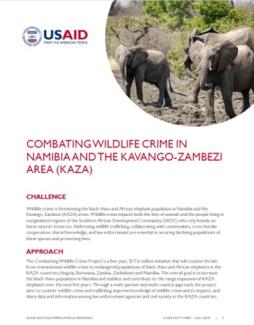CHALLENGE
Wildlife crime is threatening the black rhino and African elephant population in Namibia and the Kavango-Zambezi (KAZA) areas. Wildlife crime impacts both the lives of animals and the people living in marginalized regions of the Southern African Development Community (SADC) who rely heavily on these natural resources. Addressing wildlife trafficking, collaborating with communities, cross-border cooperation, shared knowledge, and law enforcement are essential in securing declining populations of these species and protecting lives.
APPROACH
The Combatting Wildlife Crime Project is a five-year, $17.6 million initiative that will counter threats from transnational wildlife crime to endangered populations of black rhino and African elephants in the KAZA countries (Angola, Botswana, Zambia, Zimbabwe) and Namibia. The overall goal is to increase the black rhino population in Namibia and stabilize and contribute to the range expansion of KAZA elephants over the next five years. Through a multi-partner and multi-country approach, the project aims to counter wildlife crime and trafficking, improve knowledge of wildlife crime and its impacts, and share data and information among law enforcement agencies and civil society in the KAZA countries.
Active involvement and strengthening relationships among communities, the private sector, conservation authorities, and law enforcement agencies are critical to success.
OBJECTIVES
- To combat wildlife crime by improving community engagement through increased benefits, strengthened wildlife stewardship, and more pride in wildlife.
- To strengthen surveillance capacity and anti-poaching and community collaboration, including through the private sector.
- To sustain effective investigations and prosecutions in the KAZA countries and Namibia through strengthened capacity, more emphasis and awareness of the severity of wildlife crime, and increased penalties.
EXPECTED OUTCOMES
- Increased community benefits from wildlife.
- Increased collaboration between communities and law enforcement agencies.
- Decreased poaching rates.
- Improved knowledge of wildlife crime dynamics and impacts.
- Increased information sharing among participating countries
CONTACT
Peter Bowles
pjbowles@wwf.na
+264 (0) 81 144 8691
Musonsa Ngulube
+27(0)12-452-2067
mngulube@usaid.gov

